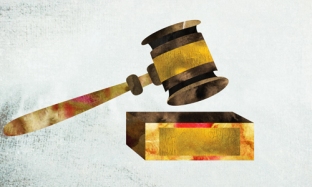Years before “Black Lives Matter” and “Blue Lives Matter” became slogans, Christopher Peterson, one of the founding fathers of positive psychology, used to say, “OPM: Other People Matter.” But millennia before him came the giving of the Torah, a Divine blueprint of transformation for both the individual and society. In an unbounded and unrestrained world where “might makes right,” G‑d introduced a new concept: You can be better than this. How so?
Shoftim
Are We Supposed to Be Happy Or Holy?
“Sometimes the quest for meaning can override the quest for happiness.”
– Roy Baumeister
The Beauty of Complexity
The beginning paragraph of Shoftim contains the famous phrase: “Justice, justice shall you pursue….” While the Torah may be poetic, it is not poetry. There is not one extraneous word, nor does the text rely on alliterative and other literary devises to turn a phrase. “Justice,” therefore, is not a single word, because justice is not a single concept; “Tzedek,” the Hebrew word for justice, embodies the double qualities of “righteousness” and “mercy.” Laws protect our safety, ensure rights, resolve conflicts, and bind us as a society. Without the underpinning of both righteousness and mercy, however, the resulting society we could create would be neither just – nor holy.
To create a holy society, however, is not just to survive, but also to thrive, and this entails altruism, the engine that drives the Jewish passion to make the world a better place. Thus, Moses was emphatically emphasizing the selfless imperatives of how we are commanded to treat the weakest of our society, lifting us above our tendencies to become self-centered. Years before “Black Lives Matter” became a slogan, Christopher Peterson, one of the founding fathers of Positive Psychology, used to say, “OPM – Other People Matter.” But millennia before Chris Peterson, came… (you get the idea).
Covenant Versus Contract
The Jewish people were on the verge of crossing the Jordan and settling the Land of Israel. As such, they would be setting up societies and implementing legal systems, the foundations of the “social contract,” so that we can all get along. Ensuring socially predictable behaviors and norms are crucial to the survival of the common order. Unlike any other society ever created before, however, driven by the economy of the marketplace and the power of the state, the Jewish nation was to be a covenantal community, based on collective responsibility.
In a lecture entitled Cultural Climate Change, Rabbi Jonathan Sacks referred to this as a society of shared values, of how we act towards each other without the market paying us to or the state forcing us to. In a covenantal society, explains Rabbi Sacks, we are all in this together, and we are all responsible for each other; otherwise, all we are left with is the social contract, which dehumanizes us. When we continue to outsource services, the state gets bigger, while our communities and we, as individuals, grow smaller.
Jews are referred to as the “People of the Covenant,” referring to the relationship between God and the Jewish people. Unless we create just and kind societies, however, based on a collective covenantal consciousness, then we are breaking faith with God, no matter how pious we may think we are. The Declaration of Independence grants individuals the right to pursue liberty and happiness. The Torah, on the other hand, envisions a holy nation pursuing justice, justice.
Resources:
Justice, Justice Shall You Pursue
Shoftim/Deuteronomy 16:20.
